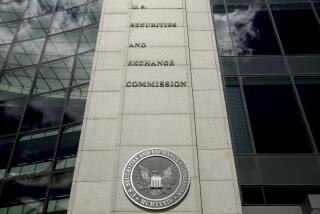SEC Says Executive Who Gave Analysts Data Broke the Law
- Share via
NEW YORK — In an unusual use of insider trading laws, the Securities and Exchange Commission filed charges Tuesday against the founder and former chairman of Irvine-based Ultrasystems Inc., accusing him of illegally leaking bad news about the company’s earnings to a select group of stock analysts in 1987.
The retired executive, Phillip J. Stevens, 62, of Newport Beach, simultaneously agreed to settle the civil charges and pay $126,455 in penalties, without admitting or denying the allegations.
Lawyers both for the SEC and Stevens said the case is the first they know of in which the agency invoked insider trading laws against a company executive for leaking information to brokerage analysts. Stevens wasn’t accused of illegal stock trading himself or of receiving any money from passing on the information.
J. Michael Brennan, Stevens’ lawyer, said his client decided to settle the case in part because fighting it in court would have been lengthy and expensive. “At this stage of his life, Mr. Stevens preferred to settle this case, particularly since there weren’t any accusations that he attempted to line his own pockets,” Brennan said.
Ultrasystems, an engineering, construction and defense concern, was later acquired by Hadson Corp.
According to the SEC complaint, Ultrasystems issued a press release in February, 1987, predicting strong profits for the company’s 1988 fiscal year, which had just begun. A short time later, however, problems with obtaining financing for several power plant construction projects led company executives to sharply revise downward Ultrasystems’ internal estimate of the company’s fiscal first-quarter earnings.
The SEC charged that on May 14, 1987, Stevens made a series of “unsolicited” phone calls to several of the stock analysts that routinely followed the company and issued recommendations on its stock. He allegedly told them about the impending bad first-quarter news. The analysts in turn warned clients, who promptly sold Ultrasystems stock, a day before the company made a public announcement of the lowered earnings estimate.
The complaint said Stevens’ actions violated insider trading laws because they involved improper use of material, non-public information. They said that although he received no money from trading based on the leaks, he benefited by improving his standing with the analysts. The SEC charged that he made the calls “to protect and enhance his reputation” with the analysts and that the leaks therefore had “direct, tangible benefit to his status as a corporate manager.”
SEC enforcement lawyer Herbert F. Janick III, one of those involved in the case, said it should be viewed as an indication that communications between corporate executives and analysts aren’t exempt from insider trading rules despite a 1983 Supreme Court decision that exonerated an analyst who warned clients about negative information he had learned about a company.
Brennan said there is “no recorded precedent” for a case against a corporate executive for passing information on to analysts. Corporate executives routinely meet with securities analysts and discuss expectations for their companies’ performance. SEC lawyers, however, said this case broke the law because Stevens called only a few analysts rather than informing all who followed the company. They noted that Ultrasystems also didn’t issue a press release about the news until a day later. Ultrasystems stock at the time traded on the American Stock Exchange.
In a famous decision on insider trading, the Supreme Court in 1983 exonerated stock analyst Raymond L. Dirks. In the early 1970s, Dirks learned that Equity Funding Corp. had defrauded investors and was on the verge of collapse. The SEC had censured him for warning his own clients before he disclosed the information to the SEC and the Wall Street Journal. The Supreme Court held that analysts don’t have the same responsibility for publicly disclosing information as corporate executives do.
The SEC didn’t accuse any analysts of wrongdoing in the Ultrasystems case.
In court documents, the SEC said the $126,455 penalty represented the amount of losses that the analysts’ customers were able to avoid by selling the company’s stock before the bad news was known publicly.
Brennan said Stevens, who is part Sioux Indian, has spent much of his time since retiring raising money for Sioux causes.






